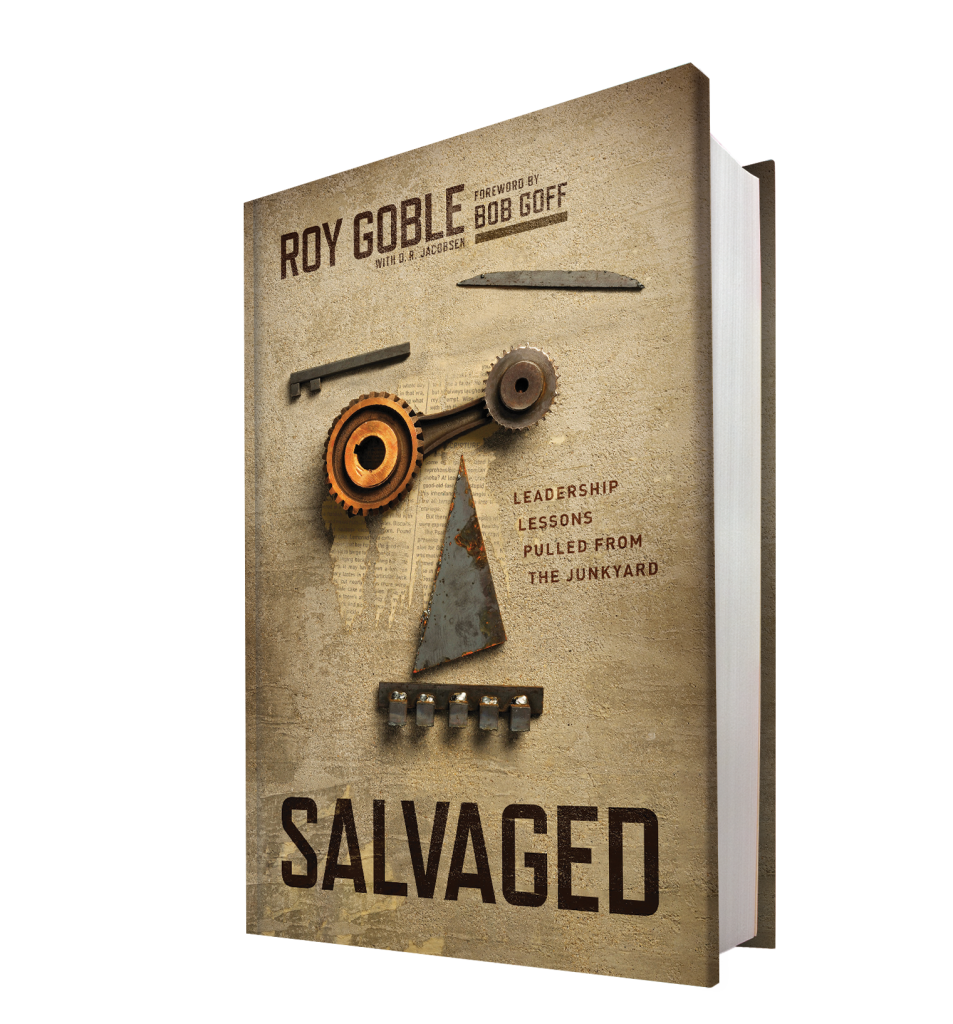We’ve all heard the saying, “It’s good to have friends in high places.” The junkyard (and I have lots of great, junkyard lessons in my book, Salvaged) turns that axiom upside down. In reality, it’s good to have friends in low places—but note that I’m not equating low with lowly or unimportant!
Most of the folks I’m talking about are decent, good people, and they’re just as important as anyone else. By “low,” I mean their position on the organizational chart, or their relative power in society. Not too many bank presidents or bestselling authors or megachurch pastors walk around a junkyard or push forms back and forth across a desk at the DMV office. Of course, not everyone in a low place is decent by default either. Some are slimeballs, just as some people in high places are. But it’s unquestionably true that most leaders could use more friends in low places rather than in high places.

I experienced this truth when I was still in elementary school. One day, I was walking home along Curtner Avenue,[1] minding my own business. I was bigger than average, so other kids typically didn’t pick fights. That was fine by me, since I wasn’t combative by nature. However, it’s possible I had a smart mouth.
(I’m learning to watch my words.)
When I was angry or just wanted to tease, I could use my words to cut to the bone. Earlier in the week, I had irritated some boys at school who were older and significantly bigger. Bad idea.
They were waiting for me at the next intersection, three against one. There was no way I could outrun them, and no way I could outfight even one. So I did the only thing I could.
I insulted them.
Aaand . . . cue fight. It was just a kid fight—no weapons or anything really scary—but I was still getting pushed around pretty good. For every bruise I gave them, I got two or three in return. After a few frantic minutes, I ran out of energy. It was time to cover my head, hunch over, and try to avoid as many blows as possible before the boys gave up and left me alone. I was going to hear all about it at school for sure . . . and the way things were going, my mom was going to give me a lecture about my ripped clothes as well.
Suddenly, the ear-wrecking roar of a motorcycle blasted through the taunts and grunts. We all looked up just as a chopper braked to a stop at the curb. The bike was a gorgeous custom job complete with an outrageously long fork and an airbrushed American flag on its gas tank. The rider was a leather-clad man with a wild beard and flaming red hair. He idled his bike to just below the volume of a jet taking off.
“Hey! Roy! You okay?”
My savior was none other than “Insane Dwayne,” one of our long-time junkyard employees and a family friend. He’d earned every bit of his nickname over the years. And by the time he spoke, one of the older boys had already taken off running.
I managed a smile. “Yeah, I think so!”
He revved his bike and the other two boys scattered like leaves.
“Thanks, Dwayne!”
He grinned, then throttled back into traffic with just the hint of a cocky fishtail. Dwayne was cool enough to keep the incident to himself, and the bigger kids at school hassled me a lot less after word spread—and rumors grew—about my friend!
These days, when I’m heading off to meet with the latest “high” person, I no longer worry if I’ll get physically pounded for my smart mouth . . . but if things get ugly, I still have Dwayne’s number.

Salvaged from Scripture
Rahab was a resident of Jericho. We’re told she was a prostitute, but it might be better to think of her as a “madam.” In our story, she has a level of power and autonomy, even though she operates her business in the gray-market economy. (You can read about her in Joshua 2 and 6).
So the Israelite spies are scouting the promised land ahead of the main army. They sneak into Jericho ahead of the siege, hoping to assess the strength of the city. They end up hiding out at Rahab’s brothel.
Unfortunately, everyone in town notices the two foreigners. The king promptly sends word to Rahab that she needs to give up the spies. But she’s playing the long game. Rahab goes to talk to the spies first and says, “Look, everyone in town knows who has the winning hand here—your god is the one who’s been slicing and dicing every enemy you’ve faced, starting with the Pharaoh and ending with the Amorites. We know Jericho is toast, but me and my family don’t have to be . . . right?”
A deal is quickly struck: If she helps the spies escape the city—and make no mistake, they’ll be tortured and murdered if she doesn’t—the spies will make sure she and her extended family are protected during the coming siege. She’s a foreign enemy. A woman. A madam. Probably the only “lower” friend in town would have been a child. But what other options do they have?
That night, the Israelite spies do the old climb-down-the-rope-over-the-city-wall routine and eventually make their way back to the Israelite camp. Battle preparations are made. Then, just before the walls of Jericho are breached, Joshua, the commander of the Israelite army, gives final instructions to the warriors. “Remember, Rahab and everyone in her house will be spared.”
After the battle, Rahab and her extended family are brought outside the ruins of Jericho, safe and sound—but it’s partly because of Rahab that the Israelites won the battle in the first place. Now that’s why you need friends in low places!
Lessons from the Junkyard
Most leaders could use more friends in low places rather than in high places.
Remember Rahab.
You need friends in low places![2]
[1] Sadly, not riding in our Rolls-Royce. Mostly, Mom made me walk.
[2] Elizabeth Symm, my wonderful copy editor, wrote the following comment on this point: “I’m suddenly reminded of Sherlock Holmes’s homeless network, which I find brilliant.” Brilliant indeed. Now I feel like Watson for not thinking of this sooner!
You have just read chapter 8 from the book, Salvaged: Leadership Lessons Pulled from the Junkyard by Roy Goble.



Thanks for your great article here, Roy. I’m sure your book is great.
I wonder if Jesus thought of people, or called people, “slimeballs”?